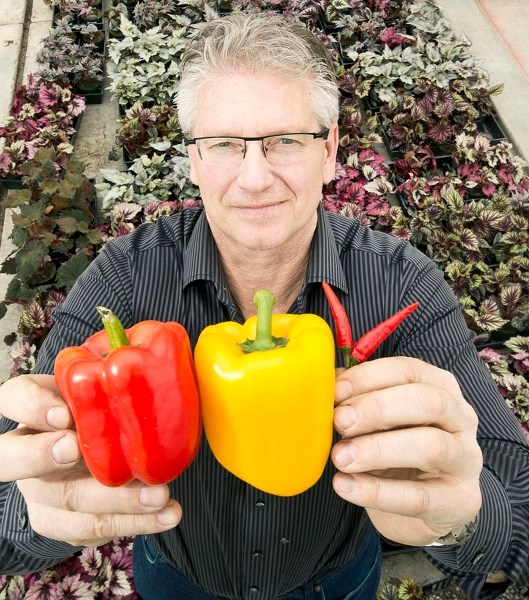Jim Hole’s name is synonymous with gardening advice through his books, newspaper columns and TV and radio appearances. He has been giving advice on the care and cultivation of plants for more than 30 years, and during that time, his passion for his subject and his interest in solving people’s gardening problems have only grown.
Jim learned the business of growing things from his parents, Ted and Lois, who set up a vegetable farm in St. Albert in the mid 1950s, expanding the business into a successful greenhouse operation. Jim has since built the greenhouse operation into the Enjoy Centre, a multifaceted outlet featuring the locally renowned greenhouses, as well as a café, bakery, spa and rental venue for weddings and conferences.
The farm was a natural laboratory for a curious boy drawn to the science, even more than the business, of the plant world, and so without any undo family pressure to pursue the family vocation, he took a degree at the University of Alberta, with a plant science major. But even before that, his interest in plant diseases and agricultural problem solving meant he was handed that aspect of the family farming business.
“Anything to do with bugs, or plant diseases or pest control got handed over to me. I just found that whole science intriguing, he says. “That’s where my strength was, so I went down that path.”
(Jim was drafted by the Edmonton Eskimos and attended camp, but decided against a professional football career.)
Since those university days, he has added numerous credentials, including certified arborist and horticulturist, as well as agrologist, and he has licenses in pesticide application and a trade ticket in landscaping.
Jim’s foray into the media came at his mother’s urging. Lois Hole was the author of gardening books, and a natural communicator. She had a radio advice spot on CBC when Jim was starting university, and she urged him to take over the radio show, which he did. (Eventually, he went on to co-author several books with his mother.)
“Mom was a good mentor. She had this natural knack to be able to get up in front of a group and speak and answer questions.” Jim admits that his own ability to get specialized information across to the layperson has improved with years of practice. Besides his media work, he give talks throughout western Canada and at the greenhouse, and, like his mother did, loves doing it.
Jim is the go-to expert, but he says the impetus for a lot of his learning and the topics for his columns come from his interaction with his customers, readers and listeners.
“People walk in the door with all kinds of questions, so you’d better be equipped with the information to help them out. That’s part of good customer service.
“You’re on the farm, in the greenhouses learning as you go, going to university, taking certain courses, but you do learn a tremendous amount from the customers,” he says.
For the radio shows, like the one he’s doing Wednesdays on the CBC’s morning drive show, Jim faces questions that call for on-the-spot expert responses, sometimes with some fairly vague information. (He also writes a monthly column, Gardening Hits & Myths for the Edmonton Journal.)
“You have to think on your feet. You have to interpret data, and sometimes the challenges are with very little background information, you’ve got to try to resolve a person’s problem.
“Some people will phone in and not know what kind of tree they have or what insect they have. But having been through it many times, you can take a pretty good educated guess at it.”
He says he’s seldom stumped by a question, but the science nerd in him goes into high gear if he can’t see a complete answer or a solution immediately. He is patient with people who present vague information, but his intellect is stimulated by a customer or caller who brings a similar passion and love of knowledge to a plant or insect problem. He loves the research as much as being able to offer a solution, he says.
“With my personality, I just can’t leave things at face value. I just have to know more about it. If somebody just tells me that’s the way it is, I tend to want to dive into the chemistry and the physiology. Some of it is pretty arcane stuff, but the more I can understand it, the more I appreciate what’s behind it. You never quit learning, and nobody ever has all the answers.”
He likes helping the like-minded gardener with a taste for the detail, but he’s equally interested in assisting the insecure gardener.
“I like both ends of the spectrum. I like it when a person, a rookie gardener, who says, ‘I don’t know anything. I’m intimidated.’ I like to get those people and put them at ease. I tell them that in my lifetime, I’ve probably killed more plants than anybody. To learn how to grow them, you have to knock the odd one off.
“I like to bring them to the level where they say, ‘I can chat with this guy. He’s not going to make me feel like an idiot.’”
Sometimes, though, the issues go beyond botany and entomology.
A woman brought a plant in, looking sheepish, he says. Her son had been growing it by his bedroom window.
“She put this plant out to me at arm’s length and turned her head away and asked, ‘Is this what I think it is?’
“It was a false aralia, which looks very similar to marijuana,” Hole says.
“A huge sigh of relief came out. She was probably the most satisfied person coming in for a diagnostic and walking out happy.”



